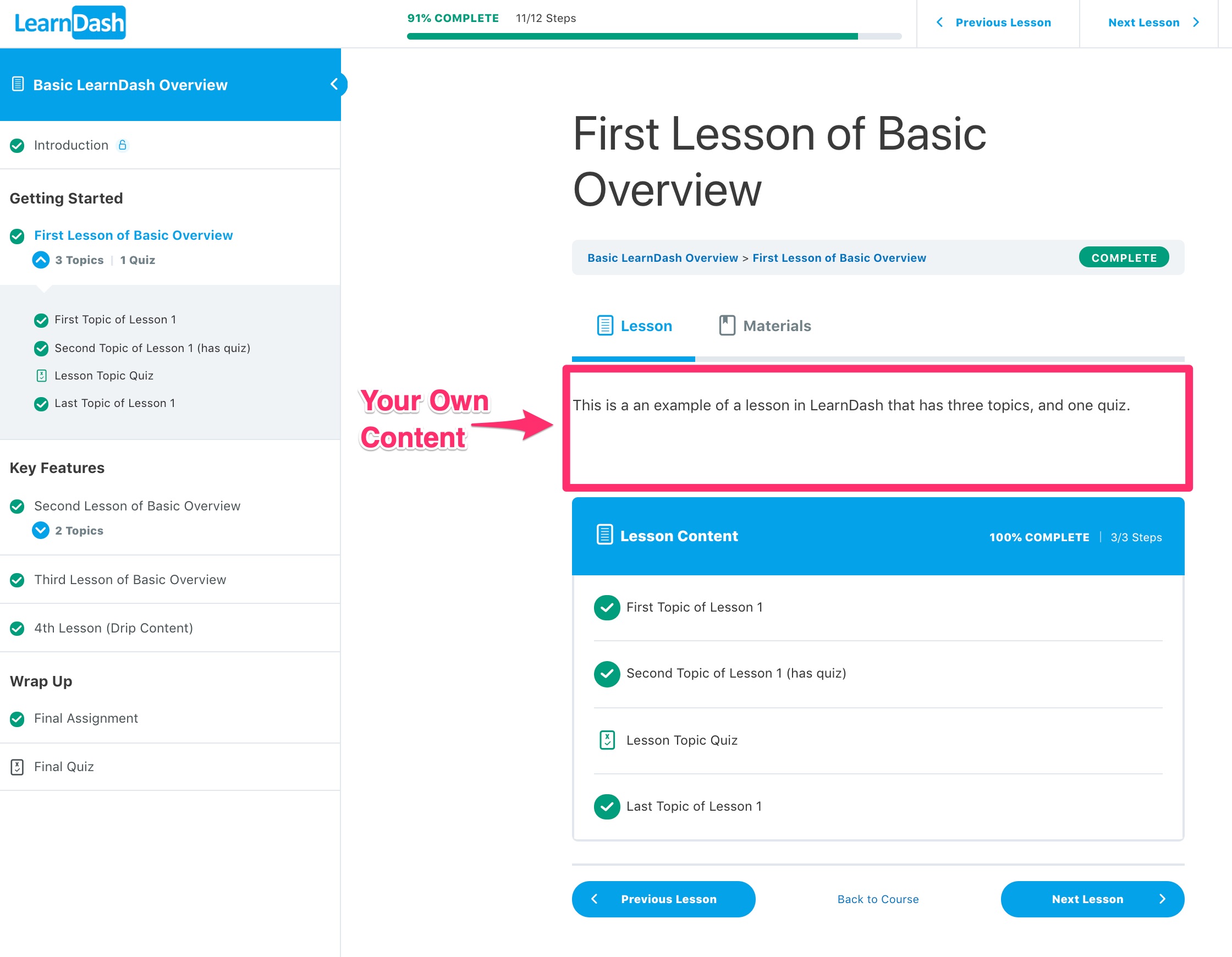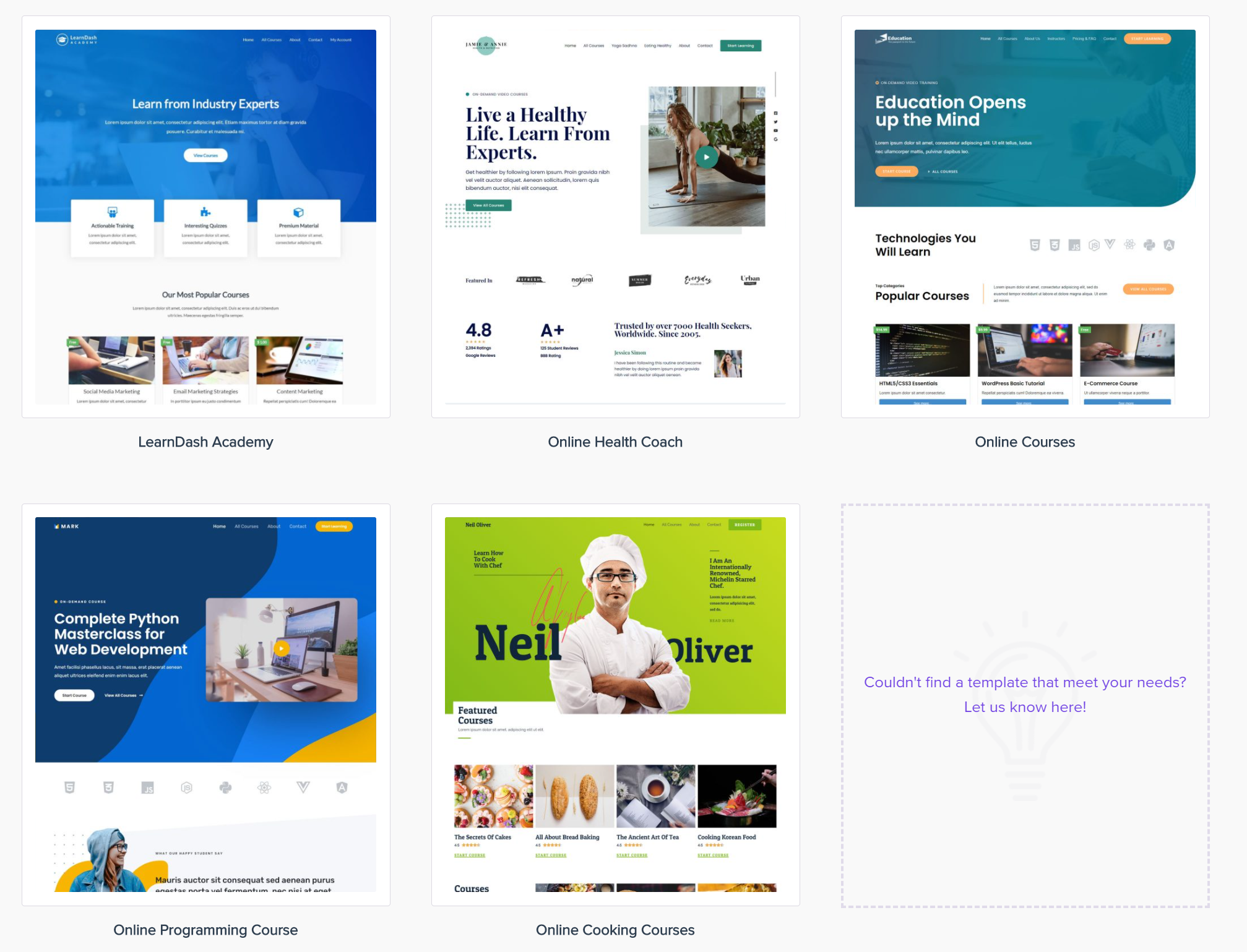Please sign in so that we can notify you about a reply
Create professional courses on your WordPress site.
Drip-feed content, embed videos, and set prerequisites or required lessons to keep learners on track.
What is LearnDash?
LearnDash transforms your WordPress site into a powerful learning management system (LMS). In minutes you can create & sell courses, track user progress, deliver certificates, award points & badges, and so much more! If you are serious about offering online courses, then LearnDash is the WordPress LMS plugin for you.
Who uses LearnDash?
Major universities, Fortune 500 companies, and best-selling authors trust in LearnDash as their WordPress LMS because it is intuitive, well-supported, has incredibly powerful features, and makes it simple to create impressive online courses.
Use LearnDash with your existing plugins and apps.
LearnDash integrates seamlessly with the tools that you already use and love: WooCommerce, Easy Digital Downloads, BuddyPress, MemberPress, PayPal, Stripe, bbPress, GravityForms, ThriveCart, Mailchimp, and 300+ other apps when using our Zapier integration.
All of these integrations (and more) are free when you choose LearnDash as your WordPress LMS!
What are the features and benefits of LearnDash?
LearnDash makes it easy to create (and even sell) online courses from your WordPress site. With LearnDash you get:
- Multi-tier courses
- Add custom colors & logos
- Drip-feed content
- Advanced quizzing
- Lesson timers
- Course prerequisites
- Learner Focus Mode
- Forums
- Course points
- Certificates & badges
- E-commerce support (one-time purchase, subscriptions, bundles, and more)
- Learner profiles
- Automatic notifications
- Group management
- Detailed reporting
- Assignments
- Expire access
- Use any WordPress theme
And more!
LearnDash is a premium plugin. The purchase of a license grants you an access to product updates, new features, and support for an entire year!
https://www.youtube.com/channel/UC1e38G3RVbTDHQrGPe1aVHw
A Learning Management System (LMS) is a software application designed to administer, deliver, track, and manage learning and training programs in various settings, from educational institutions to corporate environments. Here are some key benefits of using an LMS:
-
Centralized Learning Hub: An LMS serves as a centralized platform for organizing and delivering educational content. It provides a one-stop location for learners to access courses, materials, resources, and assessments, streamlining the learning process.
-
Flexibility and Accessibility: LMS platforms offer flexibility in learning, allowing participants to access content from anywhere, anytime, and on various devices. This accessibility caters to different learning styles and accommodates diverse schedules, enabling self-paced learning.
-
Customization and Personalization: LMS software often allows customization of courses to meet specific learning objectives. Educators or trainers can personalize content, assessments, and learning paths to suit individual learner needs, enhancing engagement and understanding.
-
Scalability and Consistency: For organizations or educational institutions with large numbers of learners, an LMS facilitates scalability. It ensures consistency in course delivery, allowing the same quality of education or training materials to be disseminated to a widespread audience.
-
Tracking and Analytics: LMS platforms provide comprehensive tracking and reporting features. Instructors, administrators, or managers can monitor learners' progress, participation, and performance through analytics and assessment results. These insights help in evaluating the effectiveness of courses and making data-driven improvements.
-
Cost-Efficiency: Utilizing an LMS can lead to cost savings compared to traditional learning methods. It reduces expenses related to physical materials, travel, and instructor-led training. Additionally, it optimizes resources and time by automating administrative tasks.
-
Collaboration and Engagement: LMS platforms often include tools for collaboration, such as discussion forums, chat features, and group activities. These functionalities foster interaction among learners, enabling collaborative learning experiences and enhancing engagement.
-
Compliance and Security: For organizations needing compliance training, an LMS helps ensure that employees receive required certifications and understand regulatory requirements. Furthermore, these systems offer secure environments for storing sensitive training data and materials.
-
Continuous Learning and Professional Development: LMS platforms facilitate continuous learning and skill development. They support ongoing training initiatives, allowing employees or learners to upskill, reskill, and stay updated with industry trends and best practices.
-
Adaptability to Different Learning Formats: LMS software can accommodate various types of content, including videos, presentations, quizzes, simulations, and more, catering to diverse learning preferences and engaging learners through multimedia-rich experiences.
In summary, Learning Management Systems offer a plethora of advantages by streamlining learning processes, enhancing engagement, providing valuable insights, and contributing to overall organizational or educational success.
No reviews found



























